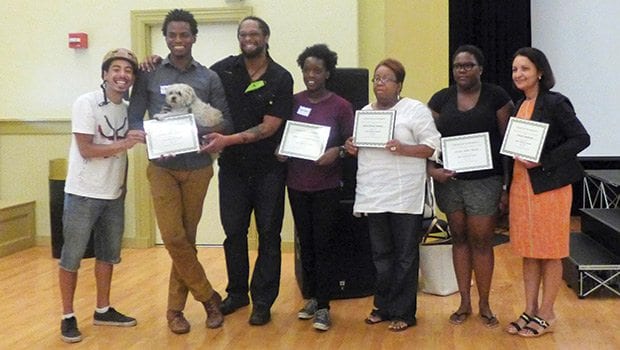Competing for local funds
Businesses make case to community-based investors

Participants in a Roxbury economic experiment pooled together $20,000 last Saturday to invest in local businesses. One hundred seventy individual lenders raised $10,000 in three days while bigger organizations matched the number, thus doubling the total investment.
On the web
YouTube video of Ujima Project, via New Economy Coalition: www.youtube.com/watch?v=2tBtam-Rvfk
Boston Ujima Project Facebook page: www.facebook.com/bostonujimaproject/
Democracy Collaborative interview with Aaron Tanaka: http://community-wealth.org/content/aaron-tanaka
Hosted by Boston Ujima Project and the Center for Economic Democracy, “Ujima Solidarity Summit: Investing in Our Community” is the first stage of a Community Capital Fund that the Ujima Project plans to organize in the future. Around 150 people were in attendance at Hibernian Hall.
“This room is full of incredible, dedicated, passionate people and for us, what’s exciting was, can we bring ourselves together in a different way?” Aaron Tanaka, a Ujima Project organizer, exclaimed to the crowd. “Ujima is giving us an opportunity to bring the activism side of the community to the economic development side.”
The Ujima Project, set to launch in 2017, intends to build a democratic community development ecosystem and local economy in Boston with a mission to invest in local businesses, create jobs and distribute wealth among communities of color.
At the Summit, five local business owners pitched the audience on why they should receive a community loan at a zero interest rate. Participants at the event then were able to vote on how the investment pool would be divided among the businesses. Voters were looking to invest in POC-owned ventures with exemplary business practices and a strong community impact.
“This is a fascinating experiment and I’m really glad it’s happening,” said Francisco Perez, a Summit attendee. “There’s a lot of excitement in the room.”
Ask and receive
Bowdoin Bike School, Fidalgo’s Wholesale & Multiservices, Fresh Food Generation, Norma’s Catering and Sydney Janey Design requested loans ranging from $2,000 to $5,000, altogether totaling $20,000. In the end, the amount awarded to each business from the community pool was proportional to the percentage of votes they received. But because outside investors were able to match funds, all businesses were given their exact loan request.
Through online and cellphone messaging, Bowdoin Bike School received 27 percent of the total votes; Fresh Food Generation received 25 percent; Norma’s Catering, 18 percent; Sydney Janey Design, 15 percent; and Fidalgo’s, 14 percent.
Bowdoin Bike School, founded by Noah Hicks, provides low cost bicycles, repair services and instruction, with the goal of making cycling more accessible to folks in Dorchester. Hicks and his business partners, Gamal Smith and Jovanny Muñoz, plan to transition from a sole proprietorship to a worker-owned co-op. Their requested loan of $3,000 will be used to improve their record keeping capacity and payroll support.
“Being able to have our business directly supported by the community, outside of people coming into the shop, is the greatest honor they can bestow upon us,” said Smith after the results came in. “They have confidence that not only are we going to be successful, but that we’re going to be responsible and give the money back.”
Fresh Food Generation, who provided complimentary lunch for the event, is a café, food truck and catering business owned by Cassandria Campbell and Jackson Renshaw. They source ingredients from local farms and work to improve low-income neighborhood access to healthy and affordable food. Their $5,000 loan will fund catering and kitchen equipment to improve efficiency.
Norma’s Catering is a catering company run by Norma Rosario that provides affordable Latin food to local nonprofits, organizations and individuals. The community’s $2,000 investment will be used to purchase business insurance and create a marketing strategy and website.
“I didn’t know there was so much support in the community. I am glad that I am here today,” Rosario said.
Sydney Janey Design is a graphic design, website design and brand strategy service created by Sydney Janey. In the future, Janey plans to open a print shop and design studio to do in-house printing as well as act as a resource to other artists or businesses in need of professional design and printing. Her $5,000 loan will go toward purchasing an Epson SureColor P6000 Designer Edition printer.
Fidalgo’s Wholesale & Multiservices is owned by Ana Maria Timas Fidalgo, who also manages Davey’s Supermarket in Roxbury. The wholesale business will provide organic produce and food to individuals or vendors. The business plans to use its $5,000 loan for a walk-in freezer to store more food and meet demand.
Each participant was encouraged to invest at least $5 to the community pool and, regardless of how much invested, each person had an equal vote in the process.
Investments were received through a Kiva Campaign created by the Ujima Project. Loans are scheduled for repayment to individual lenders in equal monthly payments over three years, with payments beginning no later than three months after the loan was made. However, there is no guarantee that the loans will be repaid in total.
To help minimize risk for investors, the Boston Impact Initiative provided funds to guarantee that 20 percent of the investments will be repaid, even if the borrowers are unable to.
The event’s matching investors included Partnership for Democracy & Education, The Working World and Local Initiatives Support Corporation (LISC) Boston.
The Ujima Project will host an Organizing Committee Meeting on September 9th. They invite members of the public to provide feedback, help set next steps and get involved in launching the Community Capital Fund in 2017.






